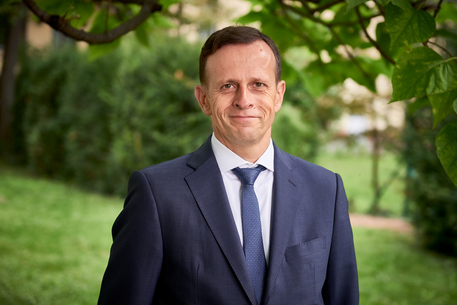Moving on: Interview with Reiner Martin, Departing Lead Economist at the JVI
May 27, 2022
Reiner Martin has been a Lead Economist at the JVI since September 2018. He spoke with JVI Newsletter staff about his experience and views on the JVI, on his achievements and new challenges.
Reiner, you worked for almost 4 years as a Lead Economist at the JVI. Can you give an overview of your role and key activities during this period?
My main task was teaching a wide range of financial sector courses, e.g. on banking supervision, financial stability surveillance, financial sector policies and fintech. I also helped to set up the JVI Webinars as a new ‘product’ and organized and moderated quite a few of these online events. Another important and very interesting activity was the design of new courses for the JVI curriculum. During my time here I launched the courses on ‘Non-Performing Loan (NPL) Management and Resolution’, ‘Real Estate Analysis’, ‘Fintech and Financial Stability’ and – together with my colleague Rilind Kabashi – the course on ‘Policy Support for the Private Sector’. Last but not least, I conducted various policy-related research projects, notably on non-performing loans, macroprudential policy and banking sector efficiency.
How would you describe your work experience at the JVI?
It was a great experience! It’s a real pleasure and privilege to interact with so many public sector officials from Central, Eastern and South-Eastern Europe, the Caucasus, and Central Asia. Teaching at the JVI is very much a two-way street. We share our knowledge, and we also learn a lot from the experience of the participants. This makes it so special and rewarding. In addition, the working atmosphere at the JVI is really excellent. It’s a small but very efficient institution, there is a great team spirit and a strong belief in the mission of the JVI. Finally, working at the JVI creates many opportunities to collaborate with colleagues from the JVI partner institutions.
Was there a specific highlight for you during this period? Any anecdote you would like to share?
There was definitely more than one! Launching the new courses that I designed were certainly highlights. One can never be sure how they work in practice until they go live, and it generally worked very well. Also, the first online events at the start of the COVID pandemic, both virtual courses and the newly designed webinars, were very special. It was something completely new for all of us and we made it happen in a very short time by pulling together very effectively. I should say that in particular the IT team made a great job to make this happen. Finally, some JVI courses are taught off-site. I had for example the pleasure to teach two courses in Georgia, which was a great experience, also due to the incredible hospitality of our Georgian colleagues!
How has the pandemic period impacted you, personally and professionally?
Like for most people, the pandemic had a big impact on me, both personally and professionally. Since Spring 2020 I was mostly working from home and although the flexibility associated with that is of course very positive, I missed the interaction with the colleagues. As I mentioned above, the JVI functioned very well during this time and adjusted rapidly to the new situation but still something is missing. This applies even more to the teaching. Delivering courses online is possible and we all developed quite some expertise in this since 2020 but in my opinion, it can’t be a full substitute for face-to-face teaching. Virtual delivery of courses works fairly well for ‘classic’ lectures, but in particular for very interactive teaching formats like group-work, workshops and participant panels, face-to-face delivery is clearly superior in my view. In addition, virtual teaching provides no substitute for the informal discussions one normally has during JVI courses, e.g. over coffee or during the course dinners. I should also say, however, that virtual course delivery allowed us to have lecturers from many different parts of the world, which we would not have been able to bring physically to Vienna. These benefits should of course be preserved.
What are you looking forward to after the JVI?
From June 1, I will be heading the Research Department of the National Bank of Slovakia. This is a very interesting and challenging new role. It’s a great combination of analytical work and direct involvement in a policy-making institution, which has a great reputation in some of my areas of interest, in particular macroprudential policy. Globally and regionally, these are extremely challenging times and there is a lot of work to be done. But of course, I will be very happy to remain involved in some of the JVI’s activities. Bratislava and Vienna are very close to each other, making it easy to collaborate also in a post-pandemic environment with face-to-face teaching.
Rilind Kabashi, Economist, Joint Vienna Institute










